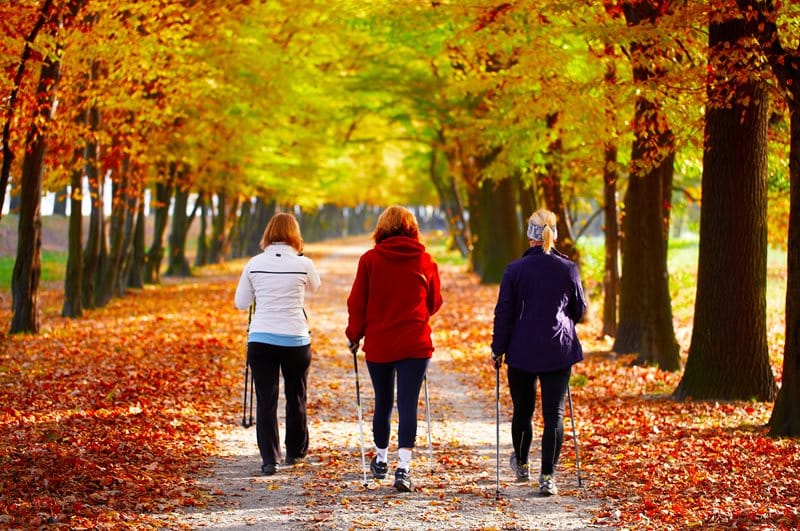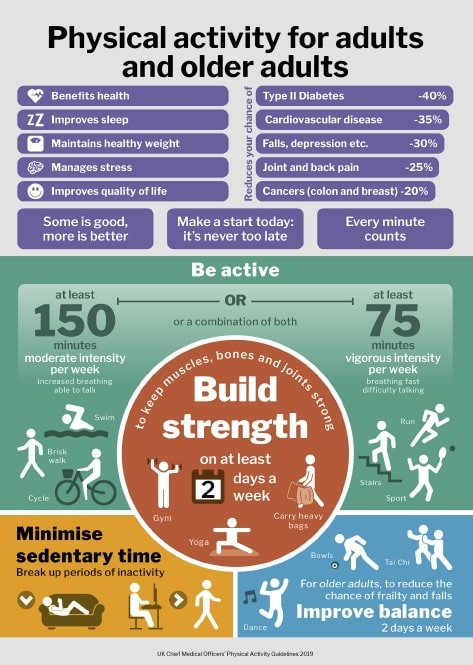
Since the UK first went into lockdown on 23 March 2020, the government has made a point of encouraging the public to continue with outdoor exercise. But with short days, rainy weather and dwindling motivation – many people struggle to make this a reality.
While we may not be able to change the weather, the dark nights, or the challenges of the current Covid-19 situation, the good news is – you can change the way you think about outdoor exercise. And doing so could lead to a whole new world of interest, enjoyment and reinvigoration.
Too often, we find ourselves falling into the trap of “all or none” thinking. The problem is – if you keep waiting for the “all”, the “none” often happens.
A 10-minute walk might not sound a lot, but research shows that walking outdoors for just 10-20 minutes can help reduce blood pressure, improve mood and reduce anxiety.
So instead of waiting until you have a full hour to get outside, focus on the fact that every minute you spend outside is beneficial for your body and mind.
It seems that becoming the guardian of one of the UK’s 300,000 allotment plots is a bit of a coup, so we asked our in-house allotment-holder, Customer Services Manager Emily Kirkland, for the low-down on life at the allotment.
If the only exercise you’re accustomed to is watching football on TV – the good news is, being active doesn’t require you to become the next Mo Farah. You can gain benefits from being active through lifestyle activities such as walking or cycling, gardening, household chores, or playing active games with your children or grandchildren.
In essence – it doesn’t matter how you move, but how much you do and how often you do it.
This government infographic shows how being active for at least 2.5 hours over the week* (that’s a 30-minute walk on 5 days of the week) can improve not only your fitness, but reduce your risk of heart attack, stroke or diabetes, and improve your quality of life and mental health.

A habit is a behaviour that you do regularly, for example daily, without having to think about it. We have many habits – some healthy (e.g. cleaning our teeth), some not so (e.g. reaching for the chocolate tin after dinner) – and these are all formed by repeating behaviours over and again. You can improve your chances of staying active if you integrate it into your daily routine. For example, could you go for a daily walk after lunch or introduce a “fake” walking or cycling commute if you’re working from home?
When I moved to homeworking in March 2020, I made a commitment to myself to carry on “cycling to work”. Ok, I can’t claim to have managed to do this every day – but on set days of the week I leave the house as though I’m going to work, cycle for 20 minutes then arrive back at my front door to start the working day! Not only does this refresh you for the day ahead, but it’s a great way to fit in outdoor exercise without taking time out of a busy schedule.
If you’re currently inactive and not sure where to start, the NHS provides two brilliant apps (Active 10 and Couch to 5K), aimed at helping beginners get active in small steps over time. Both are available to download for free for Android and Apple phones.
Active 10 tracks your steps, helps you set goals and encourages you to be active for at least 10 minutes a day.
Couch to 5K helps you learn to run 5 kilometres in as little as 9 weeks (with a choice of celebrity coaches to help motivate you). Don’t be put off if you don’t see yourself as a runner – the programme is aimed at people who are doing no running at all at the start, so you will be eased in gently. And it really does work – many people have successfully achieved what they didn’t think possible through the Couch to 5K programme.

Unfortunately, our daily lives are often consumed by thoughts of what we’re cooking for tea, what time we need to pick up the kids, or that work project we’ve been working on. Rarely do we let ourselves stop and really take in the beauty of the world around us. But – even if you live in a built-up town or city – nature is there if you look for it.
Being active outdoors – in green spaces in particular – can help us de-stress and provide a vital break from the pressures of daily life. In earlier blogs, we talked about the mental and physical benefits of gardening, and provided tips for active gardeners with long-term health conditions.
For those without a garden, it is still possible to enjoy being active in nature. Research has shown that even looking at views of green spaces has benefits for mental and physical health. If you don’t have any parks or green spaces nearby, similar benefits can be felt from “blue” spaces, such as lakes, rivers or the sea.
So when you’re out and about – try and pay conscious attention to the nature around you and absorb it with curiosity. Imagine you’re a toddler seeing it for the first time – look at the colours, the trees, the birds and the squirrels. You’ll be amazed how reinvigorated you will feel.
I was recently reminded of the joys of outdoor activity on a rainy run in Sefton Park, when I passed a toddler and his mum. The toddler was dressed in one of those all-in-one waterproofs, splashing along happily, and when he looked up at me, I could see the sheer joy in his face.
Sadly, many of us have lost sight of that natural joy as our lives have been taken over with adult responsibilities. The weather is one of the most commonly reported barriers to outdoor physical activity. Yet – except the rare occasions where the ground is covered in ice or we have gale-force winds – we’re lucky in the UK to have an ideal climate for being active. And if you’re well prepared – even the most rainy, cold and windy workout can be an exhilarating experience.
So next time you hear yourself say “it’s raining, let’s leave it” or “I’m not going out in that weather”, take a moment to stop and think – how good would it feel if I wrapped up and went out anyway? I guarantee you won’t regret it. And you might even enjoy it.
There are many different ways you can be active, and if you are going to keep it up it is important you find something you enjoy and that fits with your lifestyle. If the thought of exercise for its own sake doesn’t appeal – or you don’t feel you have time to devote to it – try combining it with something you love to do. For example, complete some gardening tasks, spend time with your family in the park, or volunteer to collect some shopping for a neighbour.
Whether you’re currently inactive, or you’re already a keen gym-goer, putting some outdoor activity into your life could have immense benefits for your mental and physical health.
A recent study showed people who have remained physically active during the Covid-19 pandemic are less likely to be depressed or anxious. And in a recent National Garden Scheme survey, 92% of respondents highlighted the importance of gardens and outdoor spaces during lockdown for their health and wellbeing.
Physically distanced outdoor exercise prevents a lower risk of virus transmission than indoor classes or gyms and – not least – there are no memberships, bus fares or entry fees to pay!
With gyms restricted and many of us facing social and psychological challenges of lockdowns, there really is no time like the present to start getting active outdoors. Remember, every little counts, focus on what you can control and try to get outside every day – you will soon start to reap the benefits outdoor exercise can bring.
When being active outdoors, please follow the Covid-19 government guidelines for your local area.
In addition, if you’re walking, running or cycling in the dark, be mindful of the ground in front of you (e.g. leaves, kerbs) and wear Hi-Viz clothing and lights to help you be seen.
If you have health concerns and are currently inactive, seek advice from your GP before starting an exercise routine.
*For children the recommendation is at least 60 minutes of physical activity every day of the week
Guest Author: Dr Paula Watson
Dr Paula Watson is a BPS Chartered Psychologist and HCPC-Registered Sport and Exercise Psychologist, with a particular interest in physical activity motivation and behaviour change. Paula splits her working week between research and teaching at Liverpool John Moores University, and running her independent exercise psychology company, Made Up to Move Ltd. You can follow Paula on Twitter @paula_watson